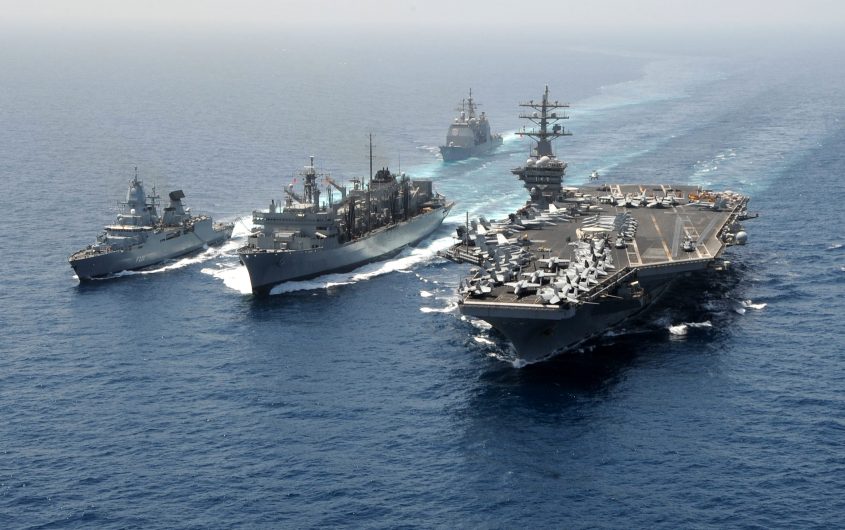
Petty Officer 2nd Class Ryan D. McLearnon, U.S. Navy via Wikimediacommons
Ohne Mich Once Again

Stephen F. Szabo
Senior Fellow
Dr. Stephen F. Szabo is a Senior Fellow at AICGS, where he focuses on German foreign and security policies and the new German role in Europe and beyond. Until 2017, he was the Executive Director of the Transatlantic Academy, a Washington, DC, based forum for research and dialogue between scholars, policy experts, and authors from both sides of the Atlantic. Prior to joining the German Marshall Fund in 2007, Dr. Szabo was Interim Dean and Associate Dean for Academic Affairs and taught European Studies at The Paul H. Nitze School of Advanced International Studies, Johns Hopkins University. He served as Professor of National Security Affairs at the National War College, National Defense University (1982-1990). He received his PhD in Political Science from Georgetown University and has been a fellow with the Alexander von Humboldt Stiftung, the Woodrow Wilson International Center for Scholars, and the American Academy in Berlin, as well as serving as Research Director at AICGS. In addition to SAIS, he has taught at the Hertie School of Governance, Georgetown University, George Washington University, and the University of Virginia. He has published widely on European and German politics and foreign policies, including. The Successor Generation: International Perspectives of Postwar Europeans, The Diplomacy of German Unification, Parting Ways: The Crisis in the German-American Relationship, and Germany, Russia and the Rise of Geo-Economics.
The German government’s decision not to participate in a Western effort to respond to Iran’s actions in the Persian Gulf is not surprising but deeply disappointing nonetheless. It is not surprising given the deep suspicion and dislike of the Trump administration and especially its Iran policies. Germans of all political stripes seem to reflexively do the opposite of whatever the American president desires or requests, even when German interests would argue for cooperation. As Christian Hacke points out in a recent opinion piece in Die Welt, this is now the case regarding Iran policy.
Germany is the most important trading state in the world [but] it does not have a navy adequate to protect the arteries crucial to the German economy.
As Hacke notes, Germany is the most important trading state in the world. Both its exports and imports are highly vulnerable to disruptions, especially regarding sea lines of communication. As it does not have a navy adequate to protect these arteries crucial to the German economy, it has to rely on the U.S. and NATO to ensure they remain open. Former German president Horst Köhler felt forced to resign after harsh criticism of his comments that pointed this out. Now the new German defense minister, Annegret Kramp-Karrenbauer, has in effect rejected an American request to participate in a naval force, along with Britain and France, to ensure that Iranian harassment and seizure of commercial vessels is halted. This after her July 24 statement upon taking the oath of office, “Frieden ist leider nicht selbstverständlich, die aktuellen Entwicklungen in der Straße von Hormus zeugen davon. Gerade in diesen Zeiten tragen wir Verantwortung für eine internationale Ordnung im engen Schulterschluss mit unseren Freunden.” (“Peace is unfortunately not self-evident, as recent events in the Strait of Hormuz have demonstrated. Especially in these times we carry a responsibility for the international order, shoulder-to-shoulder with our friends.”)
Christian Hacke argues persuasively that German Angst and its deeply anti-military strategic culture have prevailed once again over a realistic view of German interests. Germany remains a PTSD nation, whose political culture reflects a mix of remembered trauma from the most destructive war in German history and the Holocaust. This legacy has now morphed into a parochial Swiss-like free-rider approach. This was apparent in the NATO Libya intervention which found a majority of Germans supporting the idea of a humanitarian use of military force against Gaddafi combined with a view that Germans should not be part of this force.
The sorry state of the Bundeswehr includes the German navy. Currently the German navy no longer has any destroyers and only eight frigates and one operational landing vehicle. It will have a number of new corvettes and frigates coming on line this year but as of now it does not have much to offer to a potential allied force in the Persian Gulf. (See the recent report by the Parliamentary Armed Forces Commissioner Hans Peter Bartels.) Yet it needs to offer a few ships as a sign it is sharing the risk with its allies and signaling Iran that support for the nuclear deal will not prevent it from opposing Iranian aggression.
Germans also should come to understand that this continued free riding on the military force of the West will continue to undermine support for defending Germany within NATO.
As Hacke notes, the wisdom of the Trump policy regarding the Iran nuclear deal should not be linked to a blatant threat to German and Western interests in maintaining an open Persian Gulf. Germans also should come to understand that this continued free riding on the military force of the West will continue to undermine support for defending Germany within NATO. Given the impending state elections this fall in eastern Germany and the prospect that the Merkel Grand Coalition will not last beyond the end of this year, there is little prospect of a strong German response. All of this leaves a gaping hole in Western credibility and solidarity which seems unlikely to be closed by this or the next government in Berlin. While this will appeal to most Germans as resistance to a hostile and unreliable American administration, as Hacke points out, the longer-term effect will be deleterious for German interests.








